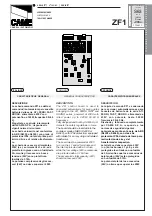
SUPER PFR
M98235804-03-11D
POWER FACTOR CONTROLLER
SUPER PFR
1.- Principal
functions
- Cos
φ
controller
Capacitor connection (6 or 12 steps)
- Network analyzer
Measurement of electrical parameters
- Alarm manager
Display and automatic solution
This manual is intended as a rapid guide to the use and operation of the
SUPER PFR
controller
.
Any manipulation or use of the equipment different from that specified by the
manufacturer may compromise user safety
. The apparatus must be disconnected
from the power supply before carrying out any maintenance operation. In the event of
failure in the operation or the protections, the unit must be left out of service and its
reconnection must be prevented until the problem has been corrected.
2.- Connections
A current transformer must be installed for the start-up (
I
n
/ 5 A) depending on the
total current of the load.
The regulator power supply voltage will be two-phase, preferably L1 for
U
L1
and L2
for
U
L2
, and the current will preferably be taken from L1. It must be supplied by
means of an automatic switch. See cable section and protections in the table of
technical features.
The current transformer must be placed in such
a way that it measures the total current of the
loads plus the capacitors.
The transformer for the leakage current must be
placed so that it measures the current in the
capacitor bank and must include lines L1, L2, L3
and N.
The unit has a switched relay exclusively for the alarm outlet.
2.1.- Communications
The
SUPER PFR
regulators can be connected to a computer or another unit by
means of the standard RS-485 bus included. This system is able to focus data
on a single registry point (Power Studio® System).
In a network of equipment, the
SUPER PFR
communicates by question-answer
(slave).
The
SUPER PFR
communicates with the
MODBUS RTU©
protocol, which
enables it to access the electrical parameter and the main variables and
configurations. Contact the manufacturer for the table of addresses.
See section 4.3. to change the communications configuration.
3.- Technical
features
Main power supply and voltage
measurement.
480, 400, 230, or 110 Vac. +15 % -10 %; 50 / 60 Hz, (see label)
Power supply:
U
L1
-
U
L2
. Measurement
U
L1
,
U
L2
,
U
L3
y
U
N
Power supply cables
Section 1.5 mm
2
, gl 0.5 to 2 A protection fuse
Current measurement circuit
Current transformer,
I
n
/5 A AC., preferably on phase L1. Min.
cable section. 2.5 mm
2
Leakage current measurement
circuit
Nominal secondary transf. current:
I
∆
sec = 2 mA AC.
Transformer with ratio of 500:
I
∆
= 1 A AC. +20%
Current measurement margin
Current
I
: 0.05 to 5 A AC. (maximum ov20 %)
Leakage current
I
∆
: 0.01...1 A AC. (maximum ov20 %)
Measurement accuracy
Voltage and current: 1 %; cos
: 2 %
1 digit
Temperature measurement
Approx. external temperature. Range: 0...80 ºC. Accuracy:
3 ºC
Consumption
8.2 VA (empty) ; 9.3 VA (6 relays); 11 VA (12 relays)
Output Relays.
Contacts
for
U
max. 250 Vac., 4 A AC., AC1.
Cabling and output relay
protection
Cable section 1.5 mm
2
, protection with circuit breaker (C curve)
of 6 A or gl 6 A fuse
Alarm relay
Switched relay for use exclusively for the alarms
Standards
IEC 62053-23 (2003-01) Ed. 1.0
IEC 61326-1, EN61010-1
UL 508
Safety /Insulation
Category III, Class II , according to EN 61010-1
Protection degree
IP40 (equipment mounted, cabinet front panel)
IP30 (equipment not mounted) according to EN-60529
Admissible environmental
conditions
Temperature: -20...+60 ºC; Relative humidity: max. 95 %
(without condensation). Max. altitude: 2000 m
Control system
FCP (a programme that minimises the number of operations)
Communications
Interface: RS-485. Protocol MODBUS.
Speed: 9600, 19200, 38400
The
SUPER PFR
regulator
measures and operates in 4
quadrants according to the
attached diagram.
Only for
SUPER PFR 12
SUPER PFR




















